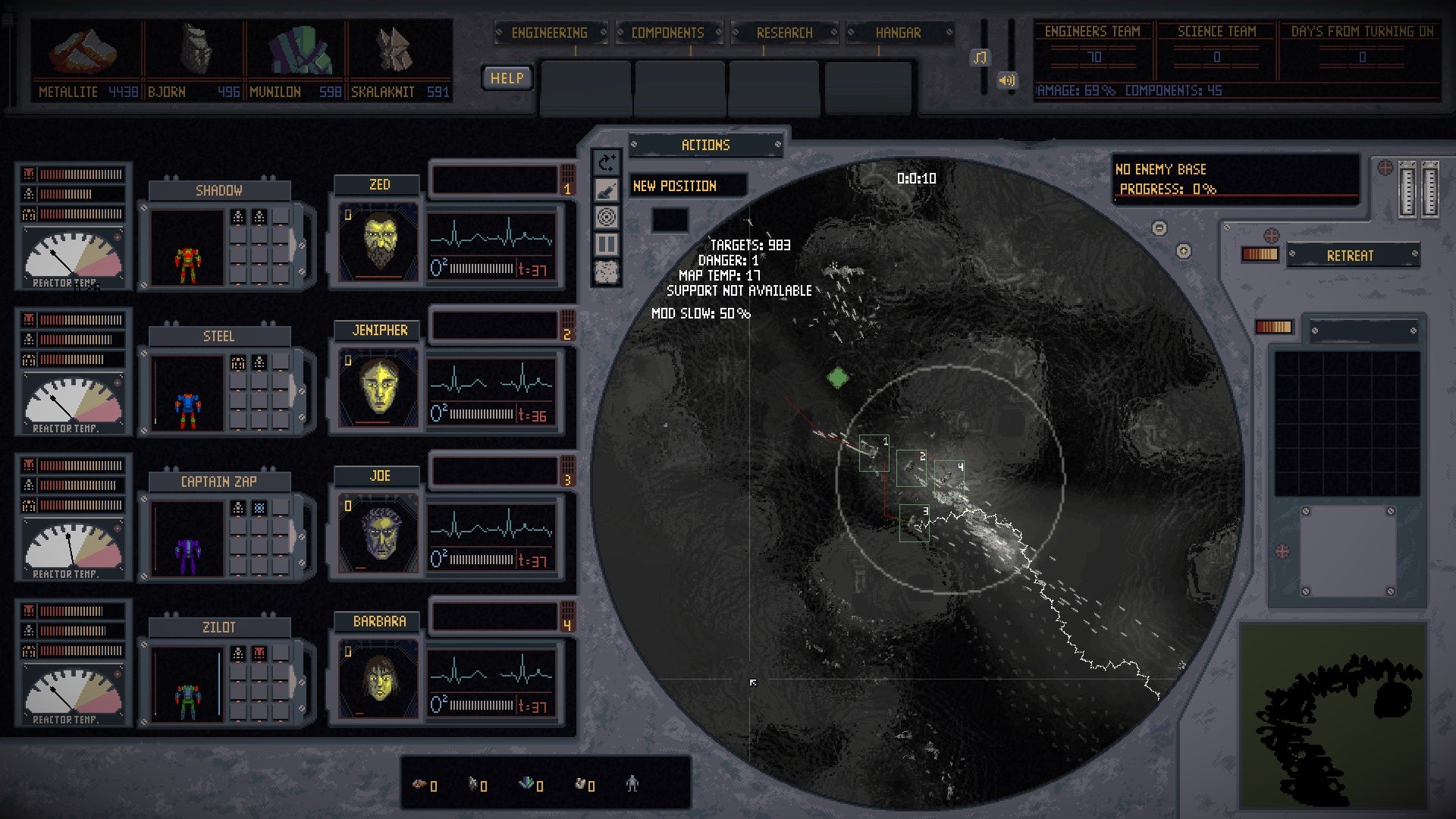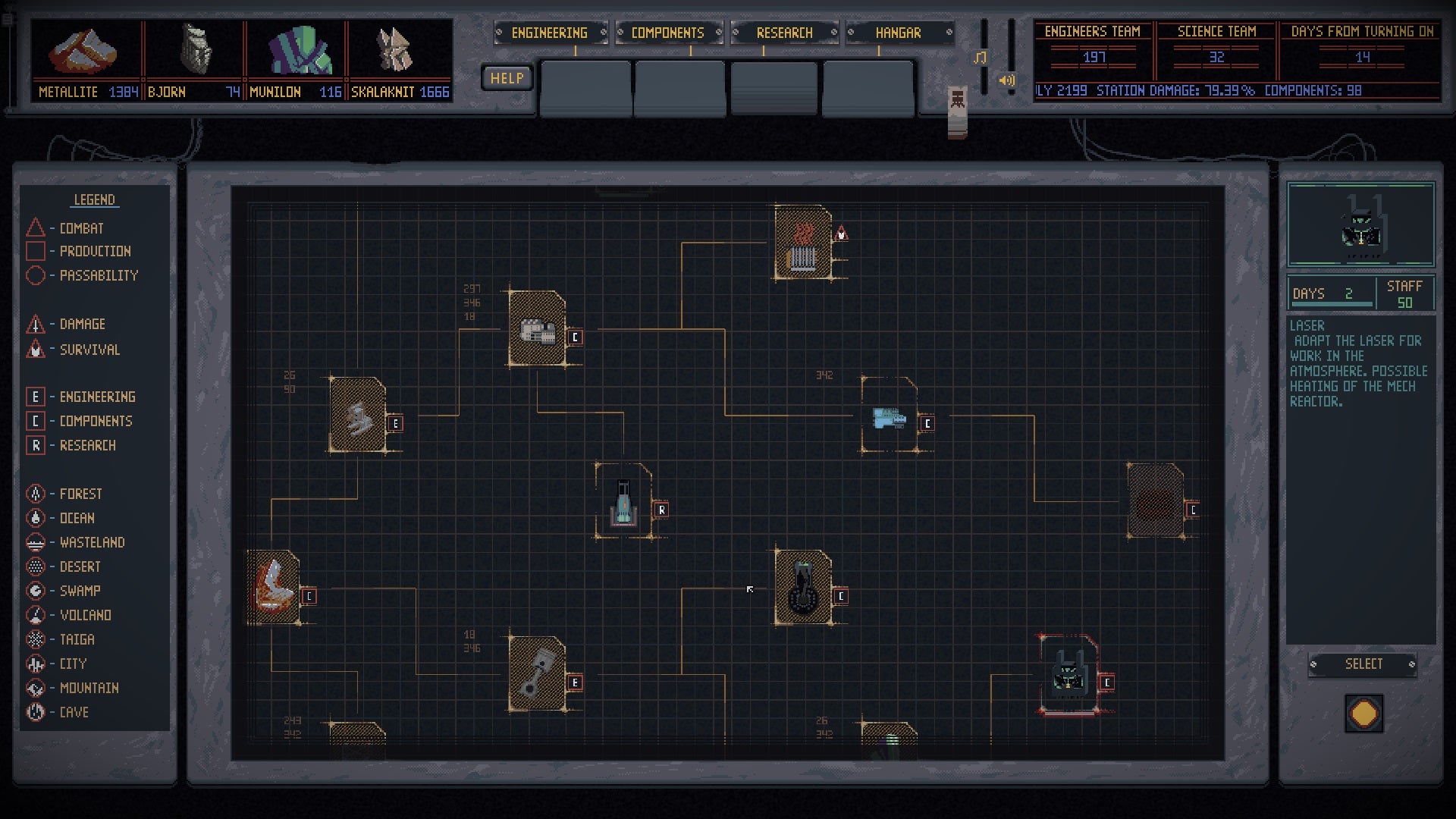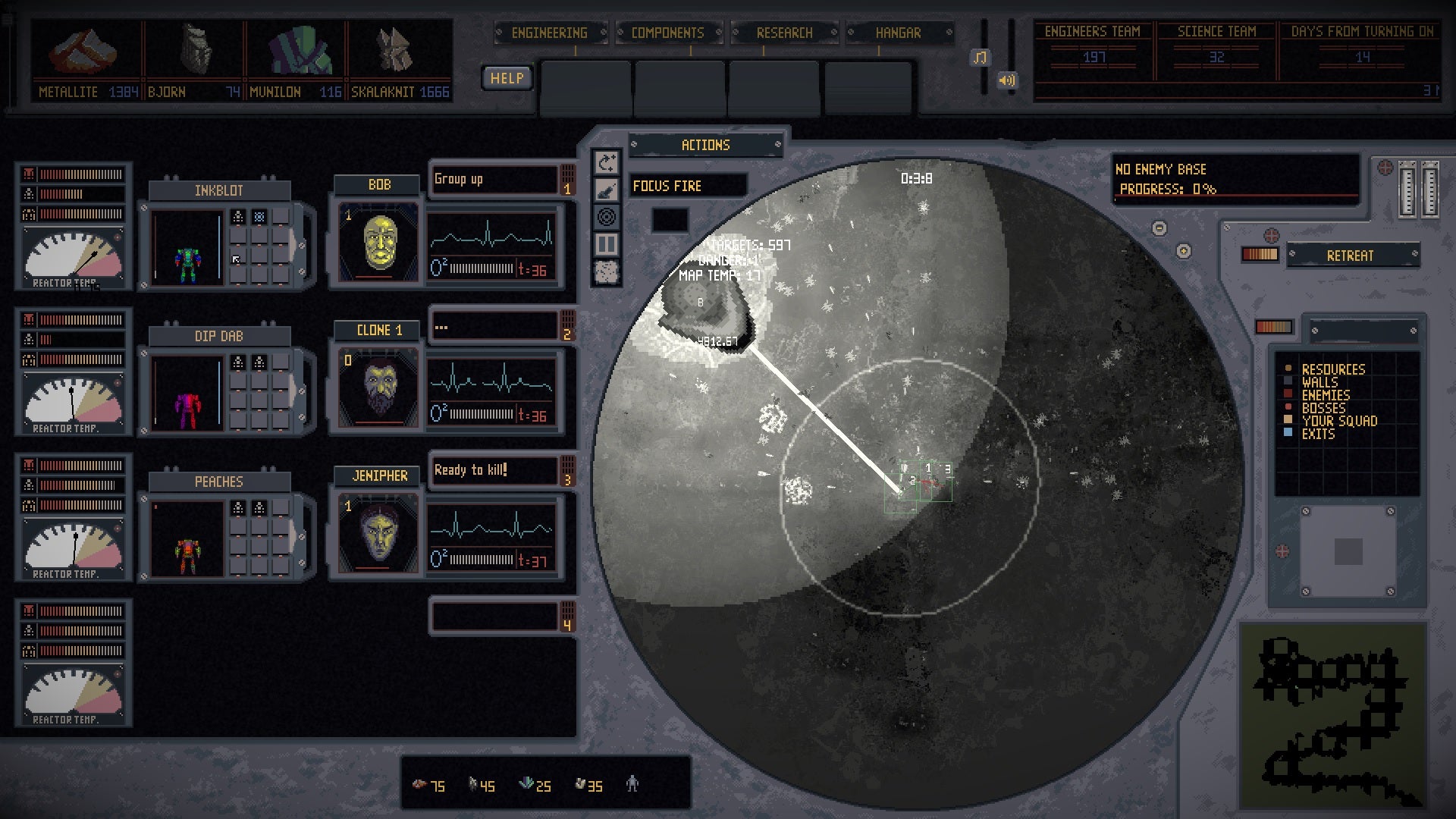It’s conceptually novel, for one. You’re the AI director of an orbital mining station that crashlanded on Earth when some idiot humans opened an interdimensional portal and aliens poured through. They swiftly conquered the planet and are ravaging and terraforming its surface while you… retooled your mechs. Your job is to explore the ruined surface, locating and then clearing a path to the facility you can use to take your refugee humans off the planet. Most squares of the gridded planet are reachable, but all are hostile, and the planet only gets worse. Each has a different layout, conditions and resident aliens, but they’re all positively teeming with nasties, making even a simple resource hunt through quiet areas dangerous. Those missions are entirely driven by you. There are no story missions or specific directions yet, and they don’t work how you might have imagined them. There’s very little direct control. A porthole gives you a top down display, upon which your mechs are a handful of green pixels in a sea of green pixels, shooting at other green pixels. And you know what? It looks great. The definition developers KiberKreker have wrung out of this monochrome style is remarkable, and the animations are excellent. Your mechs can put out a tonne of firepower and the way aliens skitter about, lunge, drag you around, and pop open in a shower of dots carry the fights in a way that, say, the abstract spheres of Deadnaut sadly never did. When things are going are good, watching your team hold ballistic court is a welcome feeling of certainty. When they’re bad, the panic rises despite the absence of any sound effects. Taking down a boss monster is often a huge tension breaker. But you probably won’t take one down for a while. Mech Engineer describes its battles, not inaccurately, as “semi-auto”. Not only are you limited to general “go here” or “focus fire here” orders, but your pilots will frequently ignore your orders. Morons. Half your battle screen is a readout of mech and pilot stats, much like Deadnaut. But even after many hours of play, I’ve little idea what many of them represent, much less how to prevent or reverse them going in the wrong direction. The battles move too quickly to register most of the feedback, and while I think this is a problem, I kind of understand it. It isn’t about controlling your mechs, it’s about designing and preparing them for whatever threats you’re pitting them against today. Moron mitigation. This was already enough to intrigue me, but Mech Engineer’s real standout point is its outfitting. It’s here where it uses simulation to establish the atmosphere and sense of responsibility that makes the game work despite its flaws. Long before your pilots can stomp on a giant alien laser sandworm, you have to fit that mech with an engine. That engine won’t go in? Of course it won’t, you haven’t switched it on yet. It won’t switch on? Well, you haven’t put a piston in it, have you? How’s it supposed to fire? Every engine in every mech. Pistons, injectors, the little panel and rod thingies in the nuclear one that I can’t remember the name of. Slot ’em all in (you’ll research multiple types) and then add your accessories. Experiment a bit to get the balance of pressure vs energy output vs heat tolerance and cooling that you need. Test them then fire them up before putting them in a mech, and then do the same for every weapon. A good mech game lets you mix and match weapons. Mech Engineer lets you configure every individual gun’s performance to your liking. Each has 23 pips that can be freely swapped to boost its rate of fire, accuracy, penetration, weight, and energy consumption, plus for a cost can be loaded up with special ammunition (ammo itself is unlimited, but not the refit). A wee monitor above this interface offers a dynamic simulation of your current configuration. You can slide a little target to any range to see exactly how the gun will fare against different armours. The key to much of the game is here. The big guns are always tempting, but maybe this next fight would be better handled by cranking up the rate of fire on dual miniguns? Or you can configure the rocket launcher for low accuracy but triple shots, or reduce the weight of the cannon and load it with incendiaries. A few weapons do dramatically more damage if you simply don’t rein in their energy consumption, letting you save up for that expensive high powered engine. But then you have to think about heat generation too, and damn, now you’ll have to switch out the motors to less power-thirsty ones. And perhaps those can’t support the weight so you’ll consider taking off some armour. This next fight won’t have many big hitters so maybe that would work… Where Mech Mechanic Simulator was a better simulation of the assembly process, Mech Engineer feels more like, well, what an engineer would be thinking about. The guy on the ship in Mechwarrior or Battletech who directs all the repairs and that. That’s you now. But repairs cost resources. Sci-fi metals must be scavenged in missions, or occasionally found as the days pass. You must manufacture everything yourself, which eats them up fast, as do some refits, and most importantly in the long term, repairing and upgrading your base itself. Yep, you have to manage that too. Hydroponics, factories, recycling, hospitals, even a prison. You’ll be taking in refugees, some wounded, and hopefully some more researchers and engineers, because every time you order a part, make a change, or even ready a mech to be examined, that takes labour. It’s here where Mech Engineer’s core design conflict looms. It’s by nature a game about experimenting and tweaking, but there’s only so much of that your engineers can do in a day before you have to move the day on. It does very little to explain itself, and punishes mistakes long before you figure out what they even are. Worse still, you only get one save. It’s auto-save all the way, and everything is final. I acknowledge I’ve complained about this many, many times before but this one really stings because goddamn is Mech Engineer punishing. You will likely lose all your mechs multiple times before working out the basics, and with almost no explanation from the game at all, you may struggle to figure out how to start a mission at all. The interface is big on dragging things to bays but small on telling you you’re supposed to drag things to bays. Documentation has slowly, slowly been coming over the last few months, but it’s still a trial and error struggle for a good while just to learn what you’re supposed to be doing, let alone how to do it. But the thing is… I’ve put up with it. I hate games that waste my time, but I don’t feel like Mech Engineer is. Part of that is because it’s in early access, and I’ve seen it move gradually towards where it is today. It’s at a point where I can write about it somewhat positively, with a very tentative “consider this game” recommendation. But part of it also has me thinking about how games that have fully documented explanations and “how to” text is one of the best things we all take for granted. I want to say, conclusively, that you can’t do this, man. You can’t make me lose my entire team without a word of feedback over and over like this. I’m supposed to hate that. But part of me loves this about it, too. I felt pleased when I figured out how to fire an engine, how to level the energy output with the cooling, even how to rebuild after wiping out all my mechs, sending out one pilot to scavenge for scraps and retreat before the full horde descended until I had enough to finish the weapons for a second mech. That took so long I’d probably already lost the campaign, but I already knew I’d try again, even though it meant going through all that engine calibration mess from scratch again. I cannot recommend Mech Engineer outright. Not yet. It badly needs better documentation. The excellently moody music and mechanical noises make the absence of any battle sounds all the more sore, and everything needs to give more feedback. Pilots ignore orders so often that I’m still not even sure if it’s left clicking or right clicking that sends orders. The logic behind food consumption is void magic to me. The bloody, bloody, pig bastard save system just doesn’t fit a game whose beginning is so laborious. But. But but but. It’s got me rethinking some of my favourite opinions and enjoying things I usually hate. Mech Engineer has a long way still to go, and I don’t know if it will fix its stride or never quite get there. But I really hope it does.



